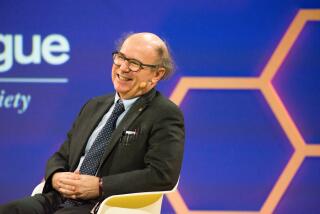Discovering the Secrets of the Old One : THE WORLD OF PHYSICS A Small Library of the Literature of Physics From Antiquity to the Present,<i> edited by Jefferson Hane Weaver (Simon & Schuster</i> : <i> $75, 3 volumes; 2,960 pp.) </i>
- Share via
This is a rich, sprawling collection of the best essays about physics, from Aristotle to black holes. The three volumes divide roughly by epochs: antiquity to the 19th Century; early “modern” work of the 20th Century, and lastly, recent exotic applications.
Introductory notes provide a narrative historical spine. Aimed at the “educated novice,” it strikes a crafty, pleasing balance between encyclopedia, source book and text. These three volumes map a voyage through the most exacting territory explored by the human mind, in the words of the navigators themselves.
Deft selections from the ancients and the medievalists bring into sharp relief a central question: Why did the Greeks accomplish so little? Because “they asked themselves the wrong questions and sought answers in the wrong way. Theirs was not a systematic study of the nature of things but a series of unrelated speculations that stemmed from no basic principles and were never tested. . . . They did not understand that no structure can exist without forces.”
This reflection resonates with the essential modern impulse in physics: unification, the desire to knit up the world with a single, elegant thread. The great edifice erected by Newton was the first attempt to deduce all of creation from simple, dynamical laws. Its victories rang down through two centuries of fevered exploration, of Byzantine implications stemming from the greatest genius of all history. The economist John Maynard Keynes, in one of this project’s purely biographical essays, ventures a guess at the nature of Newton: “I fancy his preeminence is due to his muscles of intuition being the strongest and most enduring with which man has ever been gifted. . . . Newton could hold a problem in his mind for hours and days and weeks until it surrendered to him its secret.”
Intuition marks the greatest discoveries in these volumes. Tight mathematical arguments are dressed up afterwards; they were not the instrument of discovery. When Edmund Halley, soon to be immortalized by a comet, asked Newton how he knew a certain law of planetary motion, the reclusive Cambridge don replied, “Why, I’ve known it for years. If you’ll give me a few days, I’ll certainly find you a proof of it.”
Not all loved this view of our world as a solvable riddle. Among the complex interrelationships of the 180 essays, more than 40 by Nobel laureates, there are skillfully cocked eyebrows. Jonathan Swift’s satirical “Laputa” pokes fun at scientists’ pretensions. Johannes Kepler, who painfully extracted from hard data the laws of planetary motion Newton was to deduce from universal assumptions, is represented here by “The Dream,” a moody, moving evocation of celestial mechanics as seen from the moon, rather than through his dry, precise professionalism.
Though physicists never professed to explain everything, their striking successes in their chosen arena set the tone of modern times.
It is humbling, then, to leave such august presences and learn from Richard Feynmann’s casually learned essay on basic physics that we still confront vast reaches of ignorance. Quantum mechanics has restored an essential role to human perceptions, going beyond the Newtonian clockwork universe. In the 1920s, we began to allow for the presence of the “classical observer” who forced quantum systems to “choose” a definite state, driven by the observer’s act of measuring. The philosophical implications of fundamental, necessary limits on our ability to measure and know are quite vast and yet subtle. Several essays address this, carefully pointing out that the world still sways to the rules of cause and effect, but our limited measurements force us to talk of probabilities. Mortality enters, for present theories of matter decree that nuclei themselves must eventually vanish into a spray of light and smaller particles; even diamonds aren’t forever.
Perhaps the most far-reaching impact of physics lies in its philosophical implications, rather than its useful byproduct, technology. Nineteenth-Century physics introduced entropy (Greek for “evolution”) as if replying to Darwin’s discoveries. Both seemed to demean human existence, by either depriving us of noble origins or dooming us to final darkness and “heat death.” More deeply, as Nobelist Ilya Prigogine notes, we must study systems that do not depend on isolation and objective outside observers. “Our dialogue with nature is successful only if carried on from within nature.” Is this the direction physics will follow, or will we return to more isolated clockwork pictures? Einstein himself distrusted views that stress the interactive nature of knowledge, remarking of quantum mechanics, “The theory says much but does not really bring us closer to the secret of the Old One.”
Unfortunately, the drama of physics eludes even well-educated people. I. I. Rabi remarks that “Despite its universal outlook, its unifying principle, and its splendid tradition, science seems to be no longer communicable to the great majority of educated laymen.” He proposes that professors take sabbaticals in wildly different disciplines, humanists and scientists switching roles for a while. “By taking in one another’s wash, we might all become cleaner and more wholesome.” Barring that, browsing through these varied and excellent essays would be a fine beginning.
More to Read
Sign up for our Book Club newsletter
Get the latest news, events and more from the Los Angeles Times Book Club, and help us get L.A. reading and talking.
You may occasionally receive promotional content from the Los Angeles Times.






